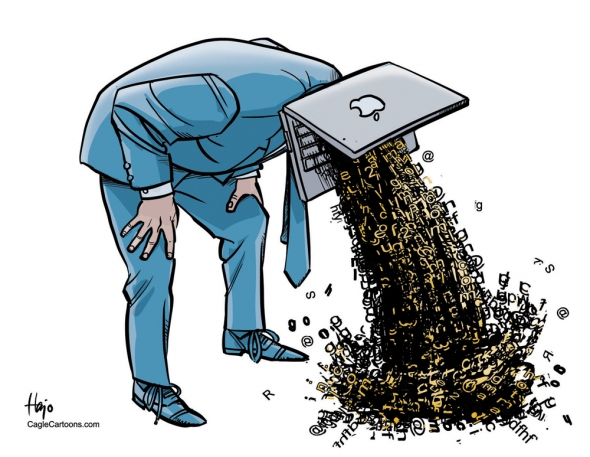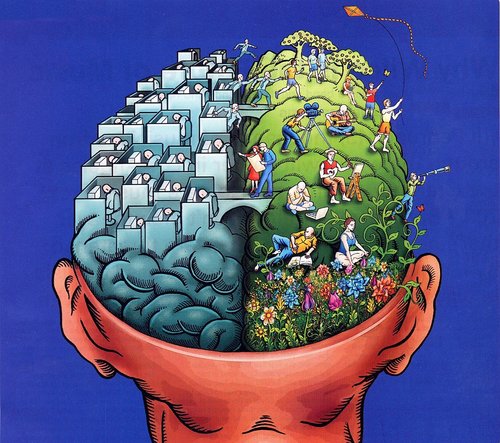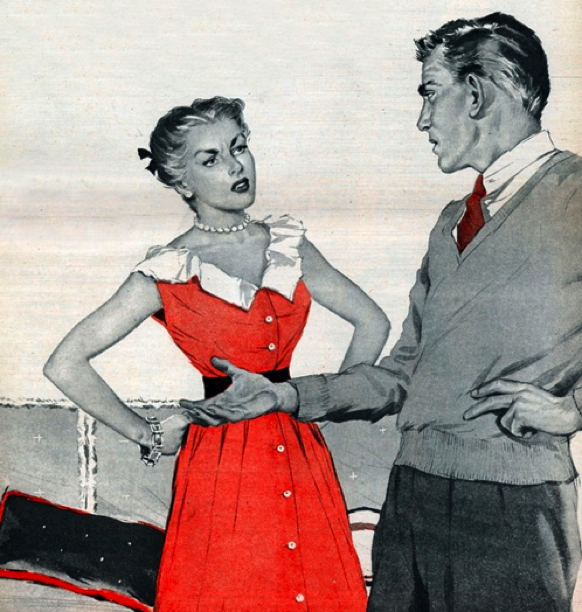We are locking horns again over the way he treats others. His tone demands I argue with him in succinct direct points, show the logic in my beliefs. If I don’t or can’t, he is superior.
But I’ve been on the ropes for too long. I’ve spent too much time with the group lately, so many people needing me. I’m strung out from too much togetherness and emotional caretaking. After several rounds of battle, my voice wavers with emotion. It’s that, just about to cry voice, that I despise myself for revealing.
I fail.
He ends the conversation by saying, I can’t even talk with you right now. You’re not rational.
Feelings count as much as facts
The above scene is all too familiar to me. Most sensitive introverts would dodge the company of such individuals. Our soft hearts and non-argumentative natures do not do well when called on the mat, forced to prove ourselves with concrete statements and voices solid with conviction. But when such individuals are part of your family you don’t have a choice.
The truth is using personal values and empathy to make decisions is rational, especially when the decisions involve people. In fact, a sensitive feeling perspective can be just what is needed to shed light on a problem and its solution. Observing, listening and putting yourself in someone else’s shoes have been found to be key attributes of successful leaders precisely because they help them make decisions that benefit the people involved.
The trouble comes in the delivery. It’s not perceived as quick enough or strong enough. This is a key struggle for this intuitive feeling introvert. My mind is so flooded with thoughts, emotions and stimulation, that I can’t process rapidly  and respond with power.
and respond with power.
A big lesson I’ve learned is that it is perfectly wise to say, I need to think about it, when asked to defend my position or make a decision. For a long time it felt like a copout but I now realize how rational and beneficial it is for my processing. The resulting replies are much more well-founded.
Knowledge is power but not for long?
Our culture has prized the knowledge purveyor and information slinger for  decades. They win arguments and make deals with their fast retorts and computer-like recall. The creative, compassionate type has been perceived as less intelligent and less successful for just as long.
decades. They win arguments and make deals with their fast retorts and computer-like recall. The creative, compassionate type has been perceived as less intelligent and less successful for just as long.
As I wrote in Introverted Not Incompetent: Validating Softer Life Skills, there’s a fair amount of shame that goes along with feelings of incompetence. I should be able to do this. Everyone else can do it. I must be slow/dumb/weak.
According to, Daniel H. Pink , author of A Whole New Mind: Why Right-Brainers Will Rule the Future, the tides are shifting and the creative, intuitive, compassionate types’ time is now. Due to abundance (think about all the items for sale in Target, Costco, Walmart), automation (computers doing number crunching and fact finding) and Asia (jobs done overseas for less) our culture is shifting from the Information Age to the Conceptual Age.
 The ability to synthesize, innovate and emotionalize is more important in the Conceptual Age. Routine knowledge work (Information Age) can be reduced to rules and farmed out to fast computers and left brain thinkers abroad. The ability to set yourself apart, empathize and tell stories becomes more valuable. As more people lead lives of abundance (own their home, have a car or two, ability to choose from 15 types of toothbrushes) a desire for meaning in life becomes more common.
The ability to synthesize, innovate and emotionalize is more important in the Conceptual Age. Routine knowledge work (Information Age) can be reduced to rules and farmed out to fast computers and left brain thinkers abroad. The ability to set yourself apart, empathize and tell stories becomes more valuable. As more people lead lives of abundance (own their home, have a car or two, ability to choose from 15 types of toothbrushes) a desire for meaning in life becomes more common.
A fact is ‘The queen died and the king died.’ A story is ‘The queen died and the king died of a broken heart.’ — E. M. Forster
Going with your gut
The job of finding a new realtor to sell our house became mine after my ex-husband and I let the first agent go. I talked to three or four agents, got referrals from friends and made my decision. My ex-husband came in at the end of the search to approve the financial portion of the contract. After the financial meeting my ex-husband told me he was not impressed with my choice.
I immediately felt compelled to spew out logical, quantifiable and concrete reasons why I chose as I did. I couldn’t do that because the truth is he just felt right. He wasn’t the business oriented, money-focused, typical real estate agent. He was professional but also creative. He had vision regarding small improvements we could do to make the house more appealing. He saw the uniqueness in our home and intended to capitalize on that by contacting potential buyers directly by phone (versus email or flyers) and telling its story. He knew how to put emotion into it and offered resources to spark the house’s interior. None of these points are particularly logical but they aligned with our needs.
So far, we’ve had more showings in two weeks than we had in two months with the old agent.
Different not better
Perhaps the soft skills will have their day. Perhaps empathy, emotion and intuition will be as respected as objectivity, conviction and facts. The truth is the world needs both skill sets. The two are both valuable and should be equally honored, just like introversion and extroversion.
Do you often feel pressure to back up your feelings and choices with quantifiable arguments? Do you have a hard time arguing your case? Do emotions speak louder than facts to you?
The Quiet Rise of Introverts is out! Perhaps it would make a nice gift for the introvert in your life. Perhaps you want to make changes in your life toward better relationships and self-compassion. The Quiet Rise is for you.
*Click on the image below to purchase.*
If you have already bought my book, thank you!!!
If this post spoke to you, you may also enjoy:
Emotional Intimacy: An Introvert’s Ultimate Turn On?
There’s Nothing Wrong with You. You’re an Introvert.
Building Beautiful Introvert/Extrovert Relationships
I’d Rather Not Compete With You:For Introverts or Anyone Who Prefers Excellence Over Dominance









[…] Sensitive and Introverted Does Not Mean Irrational and Weak: Valuing the Input of the Compassionate … […]
I think there is definitely room for both in one brain! Organizing my thoughts rationally and putting them into words for myself and others allows me to discover and listen to my emotional and intuitive resposes, which then inform my reasoning. Your post embodies this process: your reasons for preferring the second broker are actually extremely rational, in my opinion! Your intuitive and emotional insights allowed you to perceive many reasons why he would be a more effective salesman. The fact that those reasons were based in emotional responses does not make them any less reasons. After all, salesmanship is usually bound up with emotional responses by prospective buyers, whether they know it or not. The next step would be to recognize and present your insights as logical reasons for your choice.
I guess because I spent years practicing law, I developed the skill to translate from the language of intuition and emotion into the language of reason and vice versa. It’s really just like translating from English to French — the words and grammar are different, but the same concepts exist in both languages.
Well said Karen. I remember clearly when the instructor for my Myers Briggs certification said that decisions based on personal values and intuition are just as rational as those based on logic and objectivity. They are both RATIONAL ways of making decisions. What a relief, aha moment. I see your point regarding letting the emotional insights inform and help formulate the logical reasons imparted to other parties. Most people trust logic therefore we have to translate our emotional responses into logical ones in order to put the majority at ease.
Thank you for your thoughtful comment. It clarified the point I wanted to get across.
[…] Sensitive and Introverted Does Not Mean Irrational and Weak: Valuing the Input of the Compassionate … […]
All these incredible superpowers: intuition, empathy, reading others easily…
If we were jedi, i suppose we’d call it “using the Force.” We just “know” things, sometimes… like the right realtor to pick, with no idea how to explain how we knew.
I’m imagining your conversation with your ex with Darth Vador (INFJ?) theme music playing in the background, and you simply say : “I find your lack of faith in the Force… disturbing.”
You’re funny Brett! I do find a lack of faith and positivity disturbing.;)
I have been caught between the rational and the intuitive many times in my life. It is too easy to let the intuitive get shoved into a box. Iain McGilchrist talks about this from a neurological and cultural point of view in his book “The Master and His Emissary”.
Now, if I feel I am getting pushed into a corner, I ALWAYS say – “I may need to sleep on this” – or some such. After 30 years in programming I can frequently feel that a particular solution is wrong but not put it into words – without reciting a war story – only to be proven right later. A lot of my research these days is trying to enlarge the vision of the left brainers in this domain.
The reality is that both brain hemispheres need to work together. Real knowledge, understanding and meaning only happen when both sides work together, much like when we get the ‘aha!’ Archimedean moments.
Maybe – just maybe – one day – we can make business change? Oh god I hope so. I believe our very lives depend upon it. But where to start?
Thank you for yet another thought provoking post Brenda.
I imagine in your field you are swimming in a pool of rational thinkers. I agree we need to have both hemispheres of our brains working for ultimate efficiency. Daniel Pink says in A Whole New Mind that left brain directed behavior is no longer sufficient on its own. We need the right brain’s contributions as well. If we could just get the logical thinkers to accept the value of intuition, creativity, story telling, associations, metaphors, etc. Malcolm Gladwell’s book, Blink, addresses the validity of intuition, I believe. It’s been a long time since I read that.
We are evolving. Always evolving. 🙂
Thanks for your input and insight.
I emailed you privately, not sure if that email is just for comments but I emailed a story. If there is somewhere else I need to submit that to please let me know. Thank you 🙂
I received your email Jared. I am pondering my reply.:) Look for it soon.
I gave up trying to explain my intuitive decisions to anybody. I just know that when I listen to my intuition, things turn out well. That’s all I need to know.
I love your confidence Ruth.:) I am learning to trust my intuition. For a long time, I barely listened to it, let alone considered it valid input.
I know what you mean. The times I’ve ignored my intuition turned out badly. And then I kick myself. 😀